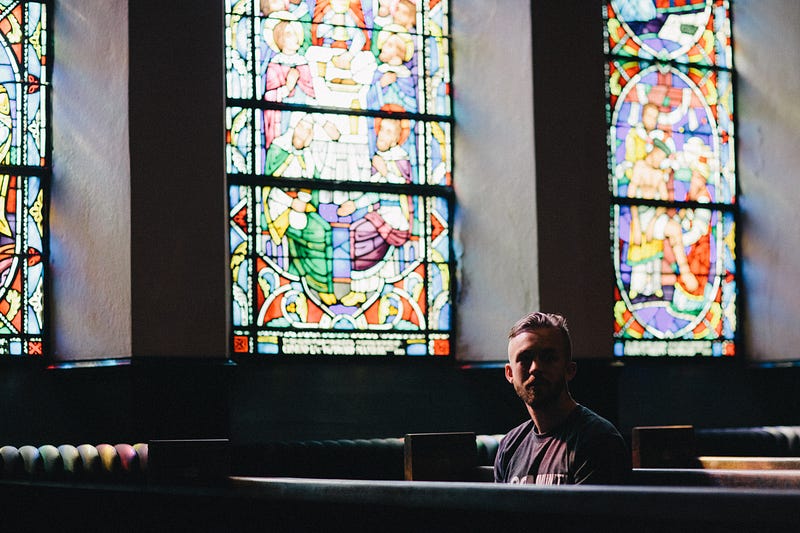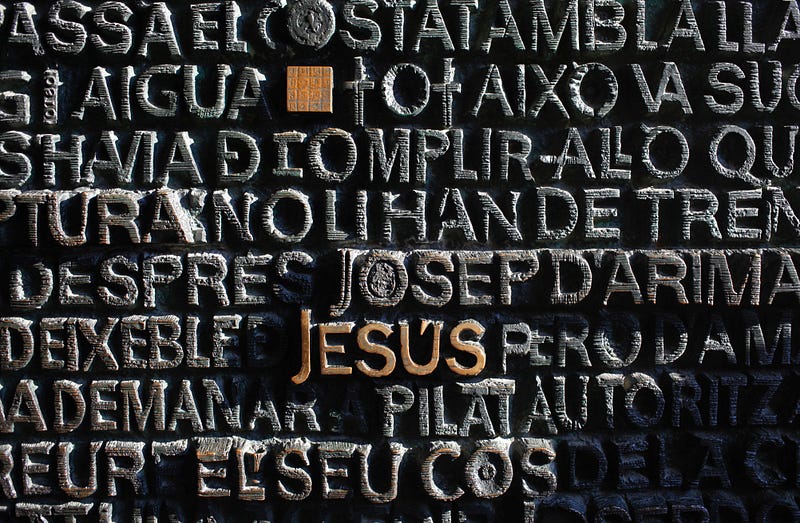Posts in "Essays"
These essays are slow reflections for real life—written from the conviction that faith is not about having all the answers, but about learning to trust God in the middle of ordinary days, honest doubts, and unfinished stories. You’ll find Scripture, personal experience, and gentle theological reflection woven together in a voice that’s more neighborly than preachy.
If you’re curious, weary, hopeful, or somewhere in between, pull up a chair. There’s no pressure to arrive—just an invitation to think, pray, and keep going.
Acta Non Verba
Do something. Don’t just talk.

Every time there is shooting we hear the following phrase, “thoughts and prayers.” Every time that phrase is uttered there are others who say, “thoughts and prayers are useless.”
I am tired of both. I am tired of seeing the religious among us continually saying, “I’m praying” but doing nothing. I am tired of the non-religious among us shaming or mocking the religious for their prayer.
When a religious person says that they are praying, they believe with their whole being that this is doing something. When I pray, I believe that God will act. I think that God responds to our prayer. If I say to you, “I am praying.” What I am saying is that I am imploring the Creator, Covenantal God to act on your behalf. I think and feel that this action is the beginning and foundation of what is required to bring about real change.
“I am praying,” means that I know the problem is bigger than me. It means that I can not fix it in my own strength or in yours. I think the thing about prayer is that it places the religious into a posture of listening and paying attention to what they will be asked to do by God to enter into the situation.
But, it seems like many don’t enter into that posture. When that happens they are not praying. They are simply send along well-wishes.
Many might be thinking, “Really? That’s harsh. That’s not a fair statement.” Please hear me loud and clear, pray. God wants us to come to him freely and openly. God wants to hear all that is on our heart. The expectation is that we will bring “everything by prayer and petition” to the Lord. God loves us. When someone loves you they want to communicate with you. They want to talk with you. God is no different. So, bring everything to God. Don’t hold back.
Yet, when we pray it ought to change us. Time with God should change us. I am learning more about this from James. He writes,
“Do not merely listen to the word, and so deceive yourselves. Do what it says. Anyone who listens to the word but does not do what it says is like someone who looks at his face in a mirror and, after looking at himself, goes away and immediately forgets what he looks like. But whoever looks intently into the perfect law that gives freedom, and continues in it — not forgetting what they have heard, but doing it — they will be blessed in what they do.”
(James 1:22–25)
He also writes,
“What good is it, my brothers and sisters, if someone claims to have faith but has no deeds? Can such faith save them? Suppose a brother or a sister is without clothes and daily food. If one of you says to them, “Go in peace; keep warm and well fed,” but does nothing about their physical needs, what good is it? In the same way, faith by itself, if it is not accompanied by action, is dead. But someone will say, “You have faith; I have deeds.” Show me your faith without deeds, and I will show you my faith by my deeds.”
(James 2:14–18)
If the religious prays and does nothing in response to their prayer I must conclude that they didn’t pray in faith. You see true faith brings about deeds. Faith is right understood as an embodied loyalty. This means that we show our loyalty in our body, our actions. Jesus’ faithfulness was shown by going to cross and rising again. His faithfulness was shown through his body in action.
When we pray in faith it compels us to action. If we do not act in response to our prayer then we are not praying in faith, but we are simply wishing.
How are you praying? Are you praying in faith or are you simply sending wishes?
It’s The Same
…the beauty of rhythm and sameness

It’s a Sunday morning and the road is winding and the sun is sparkling. The trees are glistening with a light frost on the red and gold leaves. We come around the bend and there is the church overlooking a beautifully serene lake.
This is one of my earliest memories.
The Church has played a significant and central role in my life from the beginning. Our family went to church. It’s what we did on Sunday mornings.
After church, in those days, we often went to the country club for lunch. I remember the ketchup being in little glass cups with tiny spoons. Sometimes we went to the movies with Dad after lunch.
After my parents divorce church became something different for me. It was a refuge. It became a place where I knew I was accepted and cared for. The old ladies there would give me hugs and my Mimi was always quick with a mint when my throat went dry during the service.
It was in the church that I discovered I could lead and that people would even follow me. In the church was where I began to discover a love for learning.
There was just something about church.
I grew up and went away to college. I didn’t go to church much any more. Life was full of classes and friends. I was involved with a Christian organization on campus and that didn’t leave much time for church. During those years I began to embrace a youthful version of Christianity. Corporate gatherings needed to be exciting. Humor, entertainment, and multi-media were necessities to “worship.”
Every now and then I would return home and visit church. It was the same. Same liturgy. Same hymns. Same carpet. Same smells. Same old ladies giving me hugs. Same seats.
Same.
Same.
Same.
In my youthful angst the “same” of church seemed sad. Didn’t they know they needed to keep up with the times? Where was the band and the multimedia? How could they possibly compete in the crowded church economy by being the same?
As I look back on that time in my life I simply shake my head at my immaturity. There is beauty in the “same.” There is comfort in knowing that church will be there and there will be hugs and acceptance. Knowing the words to the songs that are sung each week allows for one to enter more fully into worship.
Now, I am a pastor. A pastor of a congregation that has its own set of weekly rhythms and “same.” They are beautiful. They are wonderful. They fill me each week.
I wonder if the “same” of our congregational gatherings is to reflect Jesus?
Hebrews 13:8 says, “Jesus Christ is the same yesterday and today and forever.” The congregation is the continuing embodiment of Jesus in the world. We are “temples of the Holy Spirit.” I am beginning to grasp that not only are our individual lives to reflect Jesus but also our communal lives are to reflect him as well.
The church, the congregation, we are the body of Christ. When we gather we will reflect him. This includes reflecting Jesus in are “sameness.” There is beauty and comfort in knowing that it will be “just the same.”
The Rev Blogcast: Who Do You Represent?
Who Do You Represent?
…the responsibility of the ambassador.

Very few of us truly live in obscurity. Most likely if you are reading this you are a person who is known by others and you share freely with them your ideas. They probably see your life. Your friends know your good and bad. These people know that your’re not perfect. It’s OK that you don’t have it all together because they love you.
There are other people who watch you. Perhaps it’s the barista at your favorite coffee shop or the bartender at the pub. Maybe, it is the woman at the park with the kids playing with yours. You have no idea who is seeing you live your life.
We pay attention to people around us and we see them. We take notice at how they speak to their loved ones. Their political opinions and their religious ideas. It is almost impossible to ignore the people who are in our lives whether it is in person or on social media.
Just like we see others, they see us.
Just like we hear others, they hear us.
What kind of person are you in the world?
Are you a Christian?
If you are then who you are in the world is to be very clear and it is to be unmistakable. Read just a few of these:
‘ “You are the salt of the earth. But if the salt loses its saltiness, how can it be made salty again? It is no longer good for anything, except to be thrown out and trampled underfoot. ‘ Matthew 5:13
‘ “You are the light of the world. A town built on a hill cannot be hidden. Neither do people light a lamp and put it under a bowl. Instead they put it on its stand, and it gives light to everyone in the house. In the same way, let your light shine before others, that they may see your good deeds and glorify your Father in heaven. ‘ Matthew 5:14–16
‘ “Do not store up for yourselves treasures on earth, where moths and vermin destroy, and where thieves break in and steal. But store up for yourselves treasures in heaven, where moths and vermin do not destroy, and where thieves do not break in and steal. For where your treasure is, there your heart will be also. ‘ Matthew 6:19–21
‘ “Therefore I tell you, do not worry about your life, what you will eat or drink; or about your body, what you will wear. Is not life more than food, and the body more than clothes? ‘ Matthew 6:25
‘ “Why do you look at the speck of sawdust in your brother’s eye and pay no attention to the plank in your own eye? How can you say to your brother, ‘Let me take the speck out of your eye,’ when all the time there is a plank in your own eye? You hypocrite, first take the plank out of your own eye, and then you will see clearly to remove the speck from your brother’s eye. ‘ Matthew 7:3–5
This is but a snapshot of how we are to live from Jesus.
Check out this little thought from James,
‘Those who consider themselves religious and yet do not keep a tight rein on their tongues deceive themselves, and their religion is worthless. ‘ James 1:26
When we call ourselves, “Christian” we must realize that we are the representatives of Jesus. What does this mean exactly? It means that we have a standard to live up to. Our lives need to reflect the life of Jesus. In much of American evangelicalism there is this idea that we simply go about doing whatever it is that we want and then we ask Jesus for forgiveness. If we are living this way then our lives are most likely not united with Jesus’ life.
Secondly, we have to accept the reality that how we speak and act will show people who we believe Jesus to be. We bear his name, we are united with him in our baptism, we have been adopted into the family of God. Everything we do and say reflects back on Jesus. If we are lousy, unloving, uncaring, rude people then those around us will believe that this is what Jesus is like too. Our lives, for better or worse, are mirrors for a watching world to see Jesus.
As a Christian, every time you step out the door you are entering into the mission for which you were called. Everything you do is a reflection on your King and shows the world what his Kingdom is supposed to look like.
The Rev Blogcast: I Promise…
I Promise…
…the power of covenant.

I am leading our missional community through Micah’s prophecy. It is powerful and challenging. It calls the people of God to righteous action. Not some sort of “social just warrior” kind of action, but an action that is rooted in two things, God’s righteousness and his promises.
We live in an age where promises mean very little.
My country, the United States, is in a constant state of political campaign. Between local, state, and federal office holders politicians of some sort are always campaigning. They make promises, constantly. According to a Rasmussen report in 2014 only 4% of likely voters think that campaigning politicians will keep their promises. That means that an overwhelming majority of people will vote for someone who they don’t think will keep their word.
A bedrock promise that is made over and over in our society is the marital promise. People promise to be committed to one another “till death do us part.” The divorce in the United States is 42–45%. Nearly half of all married people do not keep their promise.
We are cynical people because we have seen promises broken on a regular basis. Promises and oaths do not mean much to people. We simply do not expect them to be kept. If we can’t expect people to keep promises in their most significant of relationships then why would expect any promises to be kept?
Yet, when we open the Scriptures and read the story of the people of God there is this overarching theme of covenant or promise. We can’t escape it.
The closing lines of Micah’s prophecy read,
“Who is a God like you, who pardons sin and forgives the transgression of the remnant of his inheritance? You do not stay angry forever but delight to show mercy. You will again have compassion on us; you will tread our sins underfoot and hurl all our iniquities into the depths of the sea. You will be faithful to Jacob, and show love to Abraham, as you pledged on oath to our ancestors in days long ago.” Micah 7:18–20, NIV
Look at the very last phrase, “as you pledged on oath to our ancestors in days long ago.”
I can’t get over it.
You can’t escape it.
God’s promise, his oath, his word, his covenant, it will stand and he will make good on it.
When you live in an age of skepticism one of the most remarkable things that anyone can do is keep their promise. It might be as simple as arriving on time some place or remembering that you promised to take a friend to the airport. Keeping promises is remarkable when nobody expects anyone to keep their promises.
Then there is this God of the Bible. This God keeps promises over a millennia. The prophets warn of discipline, they warn of exile, they warn of very real consequences to the people of God’s bad behavior. Yet, they also remind that God keeps promises and God will redeem, restore, and renew a remnant, always.
Why?
Because he promised.
The story of Jesus proves that God keeps his promises because death was not victorious over the cross. The resurrection is the culmination of the promise. There is no greater sign than that of God defeating death and raising Jesus from the dead.
The Bible is full of pain, brokenness, and hardship. There is story after story of woe and anguish. There is a sadness that pervades its pages.
There is also a hope. An enduring hope that says, “But God will keep promises.”
When we see this God act out of his righteousness and keep his promises we say like Micah, “Who is a God like you?”
The Rev Blogcast: Your Kingdom Come
Your Kingdom Come…
…or the need for a new imagination.

Christians pray the Lord’s Prayer pretty often. Some congregations pray it every Sunday. Many people pray it in their private prayer life. It is safe to say that the Lord’s prayer is central to Christian spirituality.
Yet many of us haven’t take time to even consider what we are praying. We just pray it. The words of the Lord’s Prayer become rote and can become hollow. They are intended to transform us. This prayer is powerful and can change us to our core.
Here is the prayer if you’re unfamiliar with it,
“This, then, is how you should pray: “ ‘Our Father in heaven, hallowed be your name, your kingdom come, your will be done, on earth as it is in heaven. Give us today our daily bread. And forgive us our debts, as we also have forgiven our debtors. And lead us not into temptation, but deliver us from the evil one. ’”
Jesus, in Matthew 6:9–13
I was struck this past weekend by the “your kingdom come, your will be done” bit. I was in a room of folks, who were almost all Christians, and we were talking about the prayer. As we discussed this portion in particular, I asked them to describe what the kingdom of God looks like? What would it mean for this prayer to become reality?
We stumbled around for a bit. There was little vision for what it meant to pray, “your kingdom come.”
As we talked more, it began to dawn on me that we needed to develop a kingdom imagination. So much of our Christian faith is tied to our minds and to our imaginations.
Paul says in his letter to the Romans, “Do not conform to the pattern of this world, but be transformed by the renewing of your mind. Then you will be able to test and approve what God’s will is — his good, pleasing and perfect will. (Romans 12:2)”
Why does he link the renewing of our mind to transformation and non-conformance?
I think it is because when our minds are renewed we have the ability to imagine the kingdom of God in fresh new ways. We can begin to see what this world could look like if God’s kingdom broke into time and space. When our minds are renewed we can see the world as it should be.
There is a saying in the leadership world, “Begin with the end in mind.” When we do this it is easier to figure out our plan. If we know where we are going there is a better chance that we can make it to the destination. When we pray, “your kingdom come,” we are praying with the end in mind. We are praying, “This is the world as it should be. God, help me partner with you as you bring that world to reality.”
If we can’t imagine what that world would look like, then praying, “your kingdom come” is meaningless. It’s empty words.
So what does this kingdom look like? How are our imaginations to be renewed? What is the end goal?
I think we begin in the “Beatitudes” from Matthew 5.
Blessed are the poor in spirit, for theirs is the kingdom of heaven.
Blessed are those who mourn, for they will be comforted.
Blessed are the meek, for they will inherit the earth.
Blessed are those who hunger and thirst for righteousness, for they will be filled.
Blessed are the merciful, for they will be shown mercy.
Blessed are the pure in heart, for they will see God.
Blessed are the peacemakers, for they will be called children of God.
Blessed are those who are persecuted because of righteousness, for theirs is the kingdom of heaven.
Blessed are you when people insult you, persecute you and falsely say all kinds of evil against you because of me. Rejoice and be glad, because great is your reward in heaven, for in the same way they persecuted the prophets who were before you. Matthew 5:3–12
This is the world as it should be. When we can start imagining a world like this, we can begin to imagine what it means when we pray, “your kingdom come.”
If we know where we are going, perhaps we can get there.
The Rev Blogcast: Holy Be Your Name
Holy Be Your Name
…or taking time to acknowledge God

Over the last week I have been doing something new in my spiritual practice, not asking God for anything. I have simply been taking time to acknowledge God.
It is ridiculously hard.
No, I am serious. I have never done anything this hard in prayer in my life. Spending time in prayer simply acknowledging who God is has been beyond difficult. You would think that someone who has been actively seeking to follow God since 1995 and is a “professional Christian” would be able to spend hours and hours simply acknowledging God.
Nope. I can’t.
Monday it was about 5 minutes before my mind and heart wandered to other things and people and concerns.
Tuesday it was about 2.
Wednesday, I didn’t even take time to do it because, “What’s the point?” Yes, I’m firmly Gen X.
Thursday, I figured I better make a bit more effort and was successfully able to focus on God and God alone for all of about 7 minutes! Victory! Or not.
This morning, 10 minutes, and in some sense I felt like I had just finished an hour working. Not a cardio kind of work out, but lifting weight with someone who was pushing me. I felt empty and completely filled up all at the same time.
Ten minutes.
That is the best I’ve got right now. Ten minutes.
I have been wrestling with why all week. I have been trying to hear from the Holy Spirit and what word of grace and truth was being spoken to me. I am looking to grab on to a kairos moment. A moment where God breaks in and enters my time and space. Kairos moments drive us to repent and believe. They keep us from getting stuck and propel us to grow.
Here is what I have discovered, I’m self-centered. Completely, utterly, and totally self-centered. In my relationship with God I am totally focused on me. If God were a human being he would walk away from this relationship. Nobody likes being friends with self-centered, me only, people. When it comes to God I am a taker and struggle to give.
You might be thinking, “But you’re a pastor. You’ve given your whole life to God, right?”
I may have given my best hours to serve God, but I am coming to realize that I have not even come close to giving him my life.
I take from God.
I take his grace.
I take his mercy.
I take his ear for my prayer.
I take…
I take…
I take…
Just seeing those things listed out and seeing the repeated “I” makes me sick.
Jesus said,
“This, then, is how you should pray: “ ‘Our Father in heaven, hallowed be your name,” (Matthew 6:9)
This call to begin our prayer this way challenges us. It demands us to not be self-centered. We start by giving. We begin by giving to God. When we pray we are to start with God in mind.
How do I go forward? Continuing to practice an acknowledgement of God and try to become a giver in relation to him.
